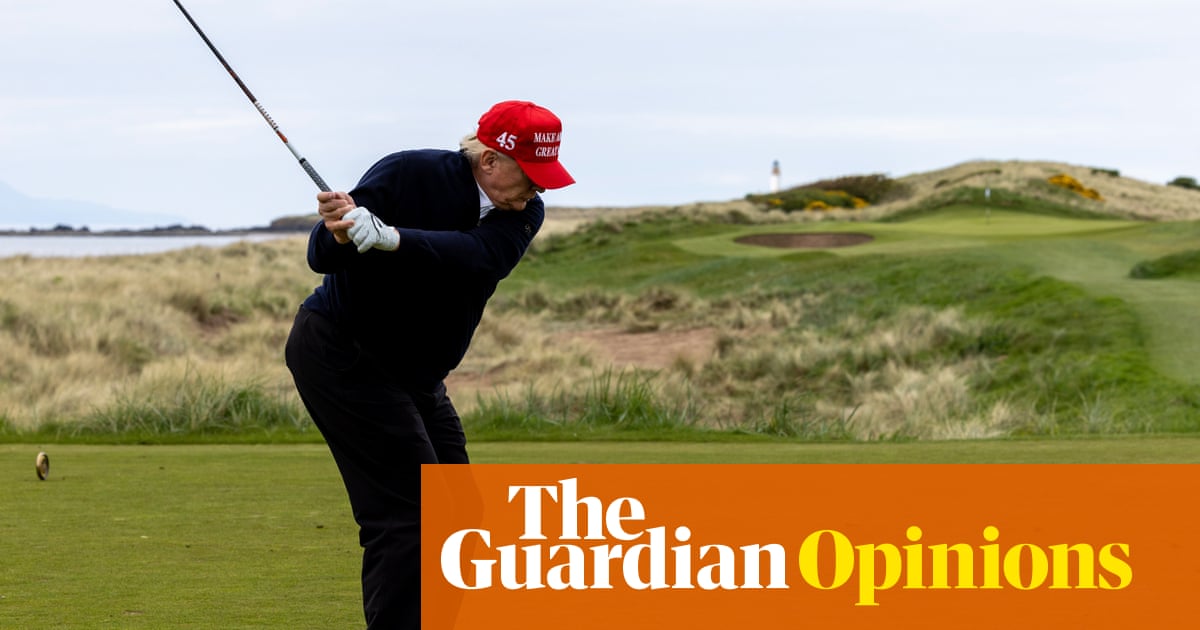We have already tumbled past the first 100 days of the second Trump presidency, careening down the hill with reckless abandon. One hundred days is, of course, a totally arbitrary milestone – a nice, round number that looks monumental because of the number of zeros attached.
Withinflationand loomingtariffscontinuing to hobble commerce, shouldn’t we extend this marker in kind? If you go by the rate of inflation since the final year before Donald Trump’s ascension to power, we should be looking at the first 133.25 days. Time itself is arbitrary, speeding up or slowing down based on context and personal perception. A minute can feel like an eternity if you’re stuck in traffic on Sunset Boulevard.
And there’s no pastime more connected to the elasticity of time than golf – a pastoral game where there’s no clock regulating speed, just a common sense of politeness for your fellow golfers and the slowly setting sun. It’s a game American presidents have loved for decades, but one that especially tickles the current occupant of the office. Of Trump’s first 100 days in office this go ’round,he’s spent parts of 40 of them(and 12 of 14 weekends) on one of his personal properties, offering the president a chance to indulge in his favorite sport. After his tariff announcement on 2 April, Trump was spotted hitting balls at Mar-a-Lago.
“The president won his second round matchup of the Senior Club Championship today in Jupiter, FL, and advances to the Championship Round tomorrow,” declared a White House statement. I wonder if they’d have issued the remarks if he had lost. Maybe they would have revised their words to soften the blow. “The President competed rigorously, showed grace and honor, and at one point miraculously revived a man who fainted in the blistering heat with a mere touch to his forehead.” Or maybe they would havedisputed the results of the match entirely.
Just last weekend,Trump golfed with the Philadelphia Eagles running back Saquon Barkleyat Trump National Golf Club in Bedminster, New Jersey, ahead of the Eagles’ visit to the White House to commemorate their victory in last year’s Super Bowl. Barkley took heat for whacking balls with Trump, but he doubled down on his incredulous enthusiasm at his good fortune on X. “lol some people are really upset cause I played golfed [sic] and flew to the White House with the PRESIDENT. Maybe I just respect the office, not a hard concept to understand. Just golfed with Obama not too long ago … and look forward to finishing my round with Trump! Now ya get out my mentions with all this politics and have amazing [sic] day.”
The implication Barkley is making is that golf is inherently apolitical, that as soon as you step on the course, nothing matters but the fun of the afternoon. Maybe there’s an element of truth to that notion that golf is a great equalizer – a sport where power dynamics are flattened and participants give themselves up to the whims of the natural world.
Or not.
I don’t understand golf. I don’t love it. But I don’t hate it, either. I have played golf multiple times. I was even gifted a set of clubs by my golf-loving father when I turned 13. I have no true antipathy toward the game. I’m simply mystified by its appeal to the rich and connected and the average citizen alike.Golfcan be played at a tony country club or a ratty nine-hole near the freeway with a six-pack of Bud Light always at the ready. OK, maybe I understand that last bit, but I just don’t get why Trump is so enamored with this game that he’ll carve out significant chunks of time in the twilight of his life to pursue it.
Granted, golf requires patience, years of practice, and mental acuity. So does knitting. Why doesn’t Trump sit at home making a lovely blanket for his wife to curl up with on the couch during The White Lotus? He could perfect the art of making gluten-free zucchini bread, then hand it out to White House staffers and ask them how much they love the carob chips he sprinkled throughout the loaf? Imagine Volodymyr Zelenskyy biting into the sweet and savory goodness of a nice slice of zucchini bread while Trump pontificates about the ceding of territory to Russia. At least Zelenskyy would have something to take home in a Tupperware container after getting shafted.
Golf is a game where futility is expected, where failure is right around the corner, and frustration is always simmering. The most exciting part of golf is hitting the ball, but the rules encourage you to hit the damn thingless,not more. Instead, most of the time during a golf game, you’re pondering, or worse yet, idly chit-chatting. The old saying goes: “golf is a good walk spoiled.” But is the walk even that good? A good walk is one where you see something unexpected, you bump into an old friend, or you have a chance to truly ruminate on the state of your life. A good walk is restorative and life-affirming. A golf course is not a pedestrian haven. It’s a zoo for people in polo shirts. You basically wander around in a circle for four hours, just to end up back where you started – a clubhouse with overpriced food and gaudy furniture.
In that sense, it might actually be the perfect game for Trump. His tenure in the White House has felt like a particularly rough round of 18 holes. Decisions, like a tiny golf ball, blown haphazardly around by the wind. Traps laid out with the explicit purpose of screwing things up for you. A journey to nowhere that ends with disappointment. And like golf, despite all the evidence to the contrary, people line up to do it all over again anyway.
Dave Schilling is a Los Angeles-based writer and humorist
